Comprehensive Report: Entrepreneurship and Small Business Mgt
VerifiedAdded on 2023/01/11
|14
|4039
|28
Report
AI Summary
This report provides a comprehensive analysis of entrepreneurship and small business management, covering different types of entrepreneurial ventures such as private, public, and social enterprises, and examining their similarities and differences, including high-growth, survival, and social ventures. It uses statistical data to illustrate the impact of small and micro-enterprises on economic growth and development in the UK, emphasizing their role in employment generation, economic development, and turnover. The report also highlights the importance of startups and small businesses in the social economy, focusing on employment opportunities for local residents, infrastructure development, innovation, and customer satisfaction. Furthermore, it explores the characteristics, traits, and skills of successful entrepreneurs, such as innovative thinking, risk-taking ability, and inquisitiveness, and discusses environmental factors that either hinder or foster entrepreneurship. The document is available on Desklib, a platform offering AI-based study tools for students.

Entrepreneurship
and small business
management
and small business
management
Paraphrase This Document
Need a fresh take? Get an instant paraphrase of this document with our AI Paraphraser
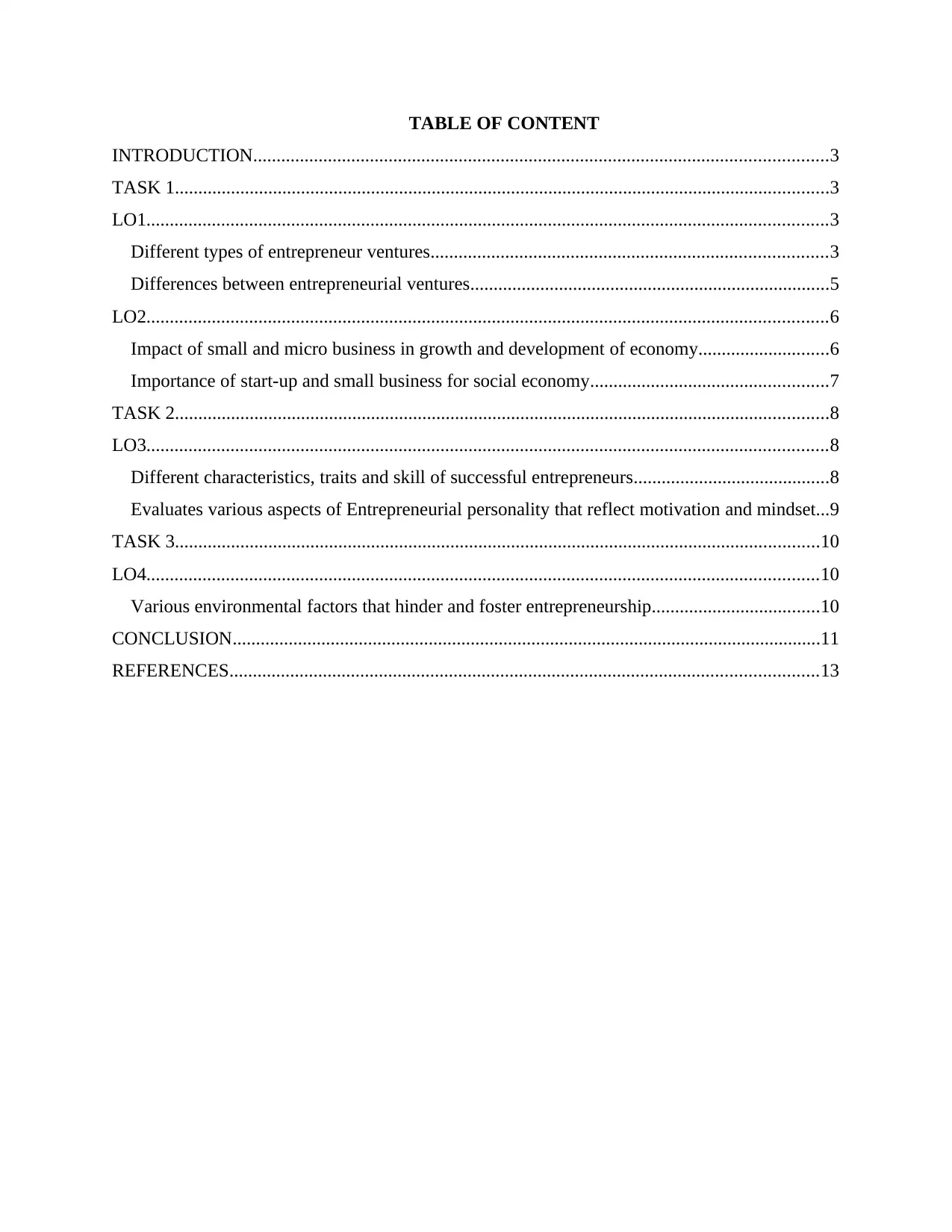
TABLE OF CONTENT
INTRODUCTION...........................................................................................................................3
TASK 1............................................................................................................................................3
LO1..................................................................................................................................................3
Different types of entrepreneur ventures.....................................................................................3
Differences between entrepreneurial ventures.............................................................................5
LO2..................................................................................................................................................6
Impact of small and micro business in growth and development of economy............................6
Importance of start-up and small business for social economy...................................................7
TASK 2............................................................................................................................................8
LO3..................................................................................................................................................8
Different characteristics, traits and skill of successful entrepreneurs..........................................8
Evaluates various aspects of Entrepreneurial personality that reflect motivation and mindset...9
TASK 3..........................................................................................................................................10
LO4................................................................................................................................................10
Various environmental factors that hinder and foster entrepreneurship....................................10
CONCLUSION..............................................................................................................................11
REFERENCES..............................................................................................................................13
INTRODUCTION...........................................................................................................................3
TASK 1............................................................................................................................................3
LO1..................................................................................................................................................3
Different types of entrepreneur ventures.....................................................................................3
Differences between entrepreneurial ventures.............................................................................5
LO2..................................................................................................................................................6
Impact of small and micro business in growth and development of economy............................6
Importance of start-up and small business for social economy...................................................7
TASK 2............................................................................................................................................8
LO3..................................................................................................................................................8
Different characteristics, traits and skill of successful entrepreneurs..........................................8
Evaluates various aspects of Entrepreneurial personality that reflect motivation and mindset...9
TASK 3..........................................................................................................................................10
LO4................................................................................................................................................10
Various environmental factors that hinder and foster entrepreneurship....................................10
CONCLUSION..............................................................................................................................11
REFERENCES..............................................................................................................................13
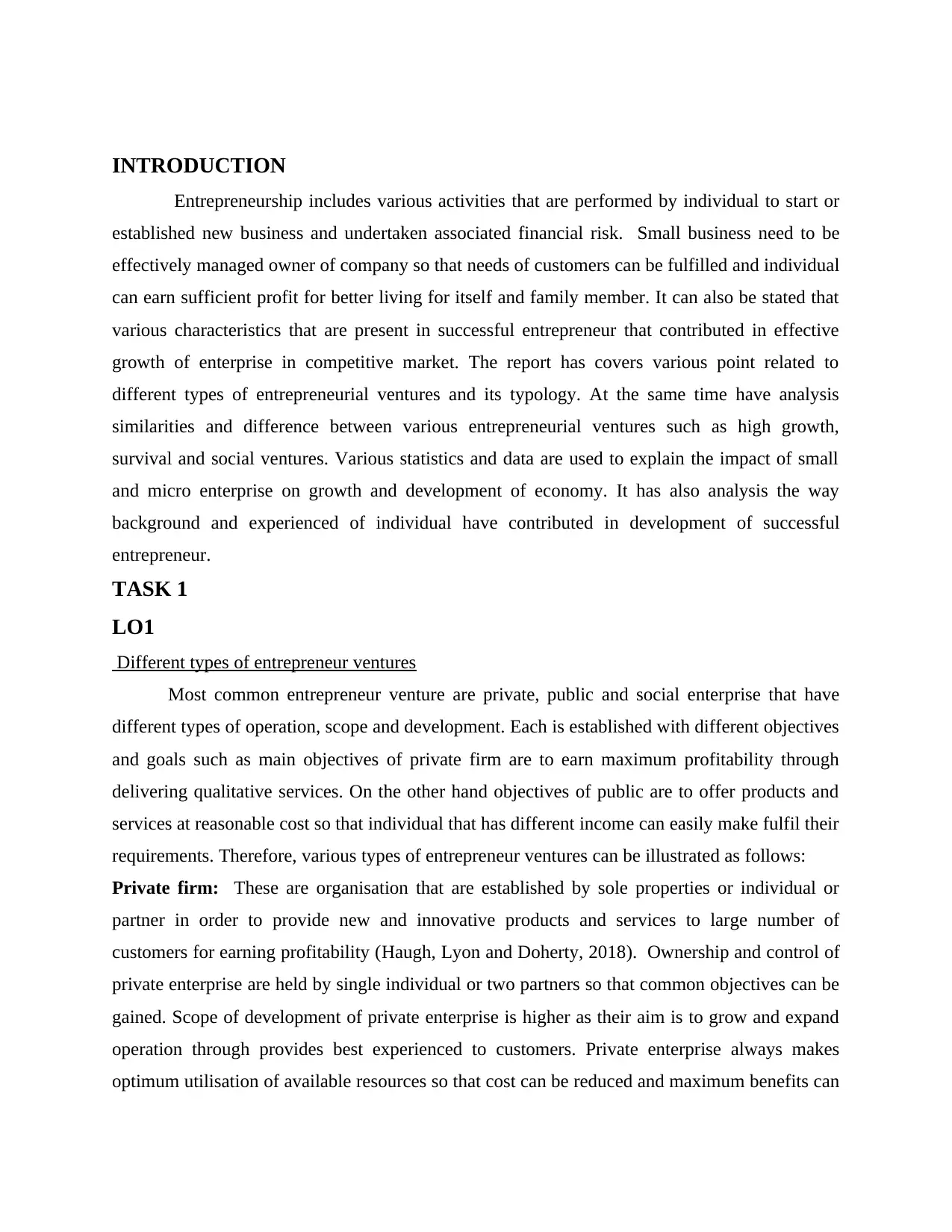
INTRODUCTION
Entrepreneurship includes various activities that are performed by individual to start or
established new business and undertaken associated financial risk. Small business need to be
effectively managed owner of company so that needs of customers can be fulfilled and individual
can earn sufficient profit for better living for itself and family member. It can also be stated that
various characteristics that are present in successful entrepreneur that contributed in effective
growth of enterprise in competitive market. The report has covers various point related to
different types of entrepreneurial ventures and its typology. At the same time have analysis
similarities and difference between various entrepreneurial ventures such as high growth,
survival and social ventures. Various statistics and data are used to explain the impact of small
and micro enterprise on growth and development of economy. It has also analysis the way
background and experienced of individual have contributed in development of successful
entrepreneur.
TASK 1
LO1
Different types of entrepreneur ventures
Most common entrepreneur venture are private, public and social enterprise that have
different types of operation, scope and development. Each is established with different objectives
and goals such as main objectives of private firm are to earn maximum profitability through
delivering qualitative services. On the other hand objectives of public are to offer products and
services at reasonable cost so that individual that has different income can easily make fulfil their
requirements. Therefore, various types of entrepreneur ventures can be illustrated as follows:
Private firm: These are organisation that are established by sole properties or individual or
partner in order to provide new and innovative products and services to large number of
customers for earning profitability (Haugh, Lyon and Doherty, 2018). Ownership and control of
private enterprise are held by single individual or two partners so that common objectives can be
gained. Scope of development of private enterprise is higher as their aim is to grow and expand
operation through provides best experienced to customers. Private enterprise always makes
optimum utilisation of available resources so that cost can be reduced and maximum benefits can
Entrepreneurship includes various activities that are performed by individual to start or
established new business and undertaken associated financial risk. Small business need to be
effectively managed owner of company so that needs of customers can be fulfilled and individual
can earn sufficient profit for better living for itself and family member. It can also be stated that
various characteristics that are present in successful entrepreneur that contributed in effective
growth of enterprise in competitive market. The report has covers various point related to
different types of entrepreneurial ventures and its typology. At the same time have analysis
similarities and difference between various entrepreneurial ventures such as high growth,
survival and social ventures. Various statistics and data are used to explain the impact of small
and micro enterprise on growth and development of economy. It has also analysis the way
background and experienced of individual have contributed in development of successful
entrepreneur.
TASK 1
LO1
Different types of entrepreneur ventures
Most common entrepreneur venture are private, public and social enterprise that have
different types of operation, scope and development. Each is established with different objectives
and goals such as main objectives of private firm are to earn maximum profitability through
delivering qualitative services. On the other hand objectives of public are to offer products and
services at reasonable cost so that individual that has different income can easily make fulfil their
requirements. Therefore, various types of entrepreneur ventures can be illustrated as follows:
Private firm: These are organisation that are established by sole properties or individual or
partner in order to provide new and innovative products and services to large number of
customers for earning profitability (Haugh, Lyon and Doherty, 2018). Ownership and control of
private enterprise are held by single individual or two partners so that common objectives can be
gained. Scope of development of private enterprise is higher as their aim is to grow and expand
operation through provides best experienced to customers. Private enterprise always makes
optimum utilisation of available resources so that cost can be reduced and maximum benefits can
⊘ This is a preview!⊘
Do you want full access?
Subscribe today to unlock all pages.

Trusted by 1+ million students worldwide
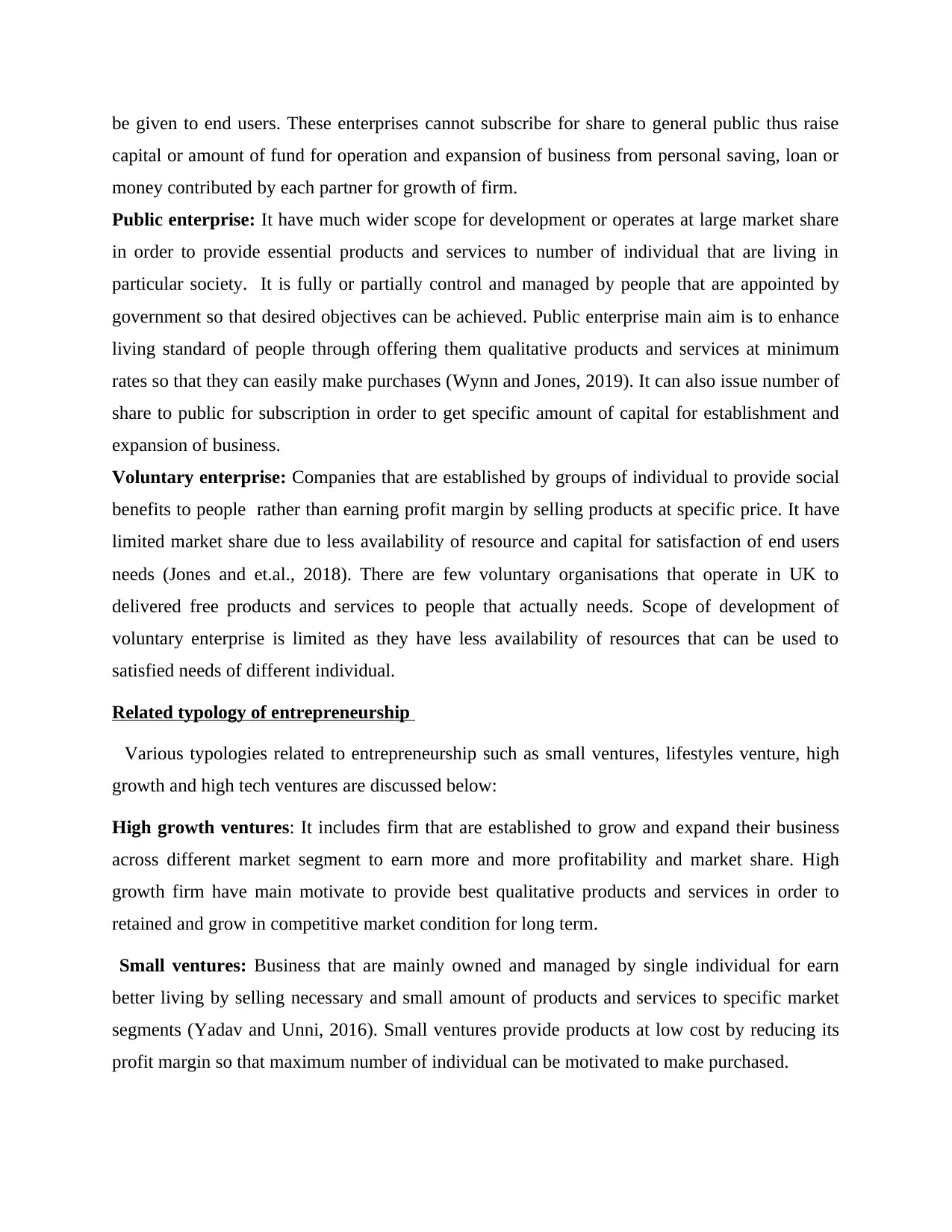
be given to end users. These enterprises cannot subscribe for share to general public thus raise
capital or amount of fund for operation and expansion of business from personal saving, loan or
money contributed by each partner for growth of firm.
Public enterprise: It have much wider scope for development or operates at large market share
in order to provide essential products and services to number of individual that are living in
particular society. It is fully or partially control and managed by people that are appointed by
government so that desired objectives can be achieved. Public enterprise main aim is to enhance
living standard of people through offering them qualitative products and services at minimum
rates so that they can easily make purchases (Wynn and Jones, 2019). It can also issue number of
share to public for subscription in order to get specific amount of capital for establishment and
expansion of business.
Voluntary enterprise: Companies that are established by groups of individual to provide social
benefits to people rather than earning profit margin by selling products at specific price. It have
limited market share due to less availability of resource and capital for satisfaction of end users
needs (Jones and et.al., 2018). There are few voluntary organisations that operate in UK to
delivered free products and services to people that actually needs. Scope of development of
voluntary enterprise is limited as they have less availability of resources that can be used to
satisfied needs of different individual.
Related typology of entrepreneurship
Various typologies related to entrepreneurship such as small ventures, lifestyles venture, high
growth and high tech ventures are discussed below:
High growth ventures: It includes firm that are established to grow and expand their business
across different market segment to earn more and more profitability and market share. High
growth firm have main motivate to provide best qualitative products and services in order to
retained and grow in competitive market condition for long term.
Small ventures: Business that are mainly owned and managed by single individual for earn
better living by selling necessary and small amount of products and services to specific market
segments (Yadav and Unni, 2016). Small ventures provide products at low cost by reducing its
profit margin so that maximum number of individual can be motivated to make purchased.
capital or amount of fund for operation and expansion of business from personal saving, loan or
money contributed by each partner for growth of firm.
Public enterprise: It have much wider scope for development or operates at large market share
in order to provide essential products and services to number of individual that are living in
particular society. It is fully or partially control and managed by people that are appointed by
government so that desired objectives can be achieved. Public enterprise main aim is to enhance
living standard of people through offering them qualitative products and services at minimum
rates so that they can easily make purchases (Wynn and Jones, 2019). It can also issue number of
share to public for subscription in order to get specific amount of capital for establishment and
expansion of business.
Voluntary enterprise: Companies that are established by groups of individual to provide social
benefits to people rather than earning profit margin by selling products at specific price. It have
limited market share due to less availability of resource and capital for satisfaction of end users
needs (Jones and et.al., 2018). There are few voluntary organisations that operate in UK to
delivered free products and services to people that actually needs. Scope of development of
voluntary enterprise is limited as they have less availability of resources that can be used to
satisfied needs of different individual.
Related typology of entrepreneurship
Various typologies related to entrepreneurship such as small ventures, lifestyles venture, high
growth and high tech ventures are discussed below:
High growth ventures: It includes firm that are established to grow and expand their business
across different market segment to earn more and more profitability and market share. High
growth firm have main motivate to provide best qualitative products and services in order to
retained and grow in competitive market condition for long term.
Small ventures: Business that are mainly owned and managed by single individual for earn
better living by selling necessary and small amount of products and services to specific market
segments (Yadav and Unni, 2016). Small ventures provide products at low cost by reducing its
profit margin so that maximum number of individual can be motivated to make purchased.
Paraphrase This Document
Need a fresh take? Get an instant paraphrase of this document with our AI Paraphraser
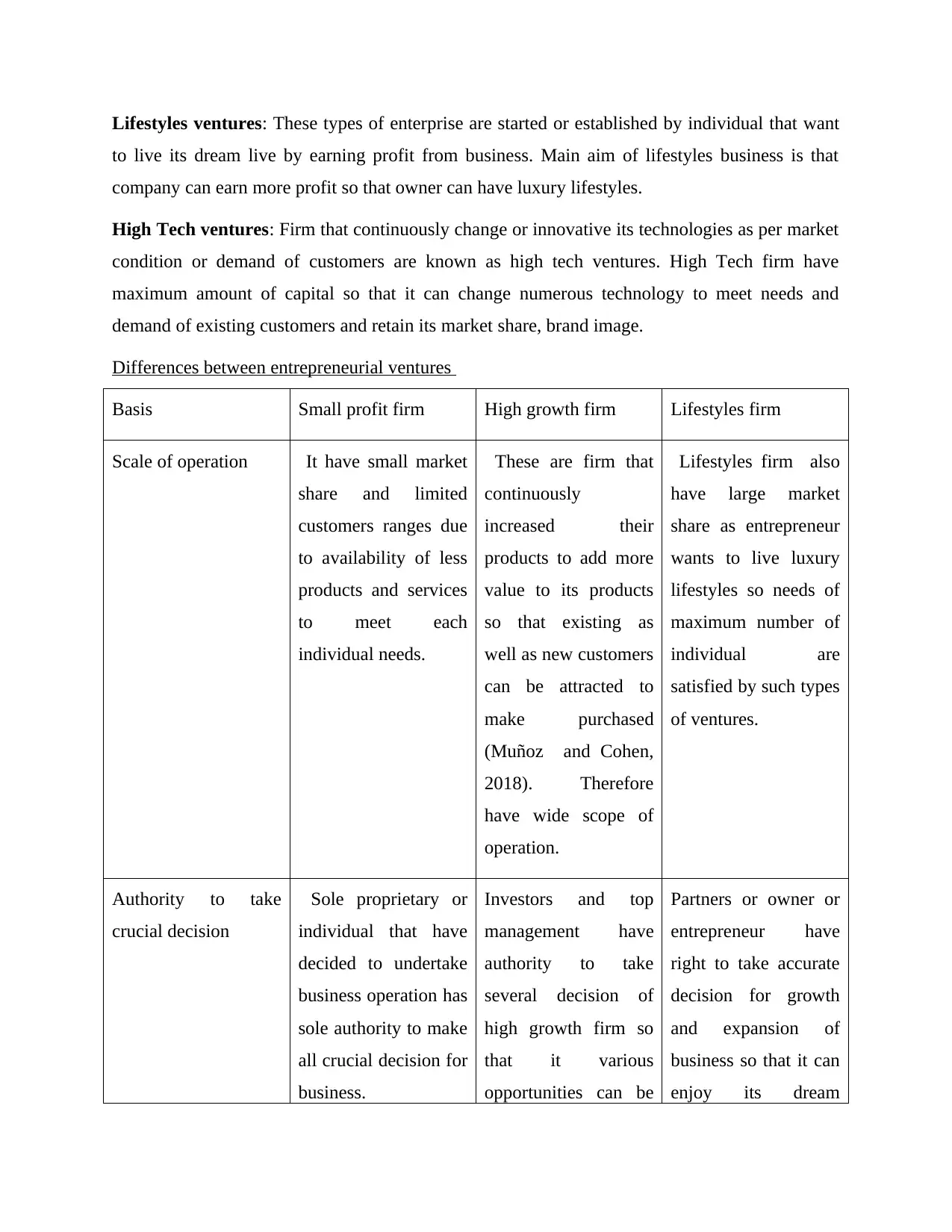
Lifestyles ventures: These types of enterprise are started or established by individual that want
to live its dream live by earning profit from business. Main aim of lifestyles business is that
company can earn more profit so that owner can have luxury lifestyles.
High Tech ventures: Firm that continuously change or innovative its technologies as per market
condition or demand of customers are known as high tech ventures. High Tech firm have
maximum amount of capital so that it can change numerous technology to meet needs and
demand of existing customers and retain its market share, brand image.
Differences between entrepreneurial ventures
Basis Small profit firm High growth firm Lifestyles firm
Scale of operation It have small market
share and limited
customers ranges due
to availability of less
products and services
to meet each
individual needs.
These are firm that
continuously
increased their
products to add more
value to its products
so that existing as
well as new customers
can be attracted to
make purchased
(Muñoz and Cohen,
2018). Therefore
have wide scope of
operation.
Lifestyles firm also
have large market
share as entrepreneur
wants to live luxury
lifestyles so needs of
maximum number of
individual are
satisfied by such types
of ventures.
Authority to take
crucial decision
Sole proprietary or
individual that have
decided to undertake
business operation has
sole authority to make
all crucial decision for
business.
Investors and top
management have
authority to take
several decision of
high growth firm so
that it various
opportunities can be
Partners or owner or
entrepreneur have
right to take accurate
decision for growth
and expansion of
business so that it can
enjoy its dream
to live its dream live by earning profit from business. Main aim of lifestyles business is that
company can earn more profit so that owner can have luxury lifestyles.
High Tech ventures: Firm that continuously change or innovative its technologies as per market
condition or demand of customers are known as high tech ventures. High Tech firm have
maximum amount of capital so that it can change numerous technology to meet needs and
demand of existing customers and retain its market share, brand image.
Differences between entrepreneurial ventures
Basis Small profit firm High growth firm Lifestyles firm
Scale of operation It have small market
share and limited
customers ranges due
to availability of less
products and services
to meet each
individual needs.
These are firm that
continuously
increased their
products to add more
value to its products
so that existing as
well as new customers
can be attracted to
make purchased
(Muñoz and Cohen,
2018). Therefore
have wide scope of
operation.
Lifestyles firm also
have large market
share as entrepreneur
wants to live luxury
lifestyles so needs of
maximum number of
individual are
satisfied by such types
of ventures.
Authority to take
crucial decision
Sole proprietary or
individual that have
decided to undertake
business operation has
sole authority to make
all crucial decision for
business.
Investors and top
management have
authority to take
several decision of
high growth firm so
that it various
opportunities can be
Partners or owner or
entrepreneur have
right to take accurate
decision for growth
and expansion of
business so that it can
enjoy its dream

utilised at minimum
time frame.
lifestyles.
Main aim of
establishment or
running of business
The main aim of small
enterprise to grow and
sustain in market
through fulfilling
needs of diverse
individual.
High growth firm
main aim is to
diversify product
portfolio and market
share so that company
can increase its sales
volume and market
share (Blaug, and
Towse, 2020).
On the other hand
lifestyles firm have
objectives to provided
better products and
services to end user so
that they can be
influenced to make
more purchased with
firm so that
entrepreneur can
enjoy profit.
Similarities between different ventures:
Brand image: Small, high growth and lifestyles enterprise put their best efforts to established
strong brand image and customers loyalty in market so that they can enjoy profitability for long
term.
Management: It can also be stated that lifestyles, high growth and small enterprise effectively
managed their business so that overall goals of business can be achieved. Effective management
helps them to make optimum utilisation of available resources for providing maximum benefits
to customers.
LO2
Impact of small and micro business in growth and development of economy
Business that have lowest turnover, market share and employees ranging between 0-10
come under micro enterprise on the other hand enterprise that have hired people between 0-50
are knows as small enterprise. It also have small market share, limited resources that is operated
for earning sufficient profit for family members (Muralidharan and Pathak, 2017). Large
enterprise have wide products portfolio, customers satisfaction and have presence in more than
time frame.
lifestyles.
Main aim of
establishment or
running of business
The main aim of small
enterprise to grow and
sustain in market
through fulfilling
needs of diverse
individual.
High growth firm
main aim is to
diversify product
portfolio and market
share so that company
can increase its sales
volume and market
share (Blaug, and
Towse, 2020).
On the other hand
lifestyles firm have
objectives to provided
better products and
services to end user so
that they can be
influenced to make
more purchased with
firm so that
entrepreneur can
enjoy profit.
Similarities between different ventures:
Brand image: Small, high growth and lifestyles enterprise put their best efforts to established
strong brand image and customers loyalty in market so that they can enjoy profitability for long
term.
Management: It can also be stated that lifestyles, high growth and small enterprise effectively
managed their business so that overall goals of business can be achieved. Effective management
helps them to make optimum utilisation of available resources for providing maximum benefits
to customers.
LO2
Impact of small and micro business in growth and development of economy
Business that have lowest turnover, market share and employees ranging between 0-10
come under micro enterprise on the other hand enterprise that have hired people between 0-50
are knows as small enterprise. It also have small market share, limited resources that is operated
for earning sufficient profit for family members (Muralidharan and Pathak, 2017). Large
enterprise have wide products portfolio, customers satisfaction and have presence in more than
⊘ This is a preview!⊘
Do you want full access?
Subscribe today to unlock all pages.

Trusted by 1+ million students worldwide

one country. Therefore, the way small and micro businesses have contributed in growth and
development of UK economy can be illustrated as follows:
Employment generation: Micro and small enterprise have highest contributed in generation of
employment for people as compared to large organisation. Such as 23.3% people are employed
by small and micro business whereas only 0.65 and 0.1 are hired by medium and large enterprise
respectively in UK. It can also be stated that 60% employment opportunities in private sectors
are given by small and micro business (5 Reasom why UK small and business are vital for UK
economy, 2018).
Development of economy: Small and micro enterprise generated more revenue as compared to
large enterprise that employees more number of people. On an average small enterprise earn
8000 with having no employees or twice than 19000 in case of employing people between 0-10.
On the other hand small enterprise generated revenue of about 56000 and medium enterprise of
29400. Therefore it can be stated that small scale enterprise despite employing less number of
people have contributed well in economy development and adding value in GDP of country.
Turnover: It can be stated that 99.9% of business belong to SME that have contributed in 51%
generation of turnover in private sectors. Retail sectors of UK have generated total 33.7% of
turnover that has helped in increasing employment opportunity and enhancement in living
standard of people.
Competition: Small and micro business are increasing continuously in UK that have lead to
impact competition level and better satisfaction of customers. There are large number of
companies with different products and services to offer unique and standard products and
services to end users for earning profitability.
Importance of start-up and small business for social economy
Many of the individual have decided to start their own business in order to enjoy
independent and better lifestyles. So they have used their saving or take bank loan to start small
business for meeting needs of few individual that stay in particular society (Anggadwita and
et.al., 2017). Therefore various importance of small and start-up enterprise in growth and
enhancement of living standard of local communities can be as follows:
development of UK economy can be illustrated as follows:
Employment generation: Micro and small enterprise have highest contributed in generation of
employment for people as compared to large organisation. Such as 23.3% people are employed
by small and micro business whereas only 0.65 and 0.1 are hired by medium and large enterprise
respectively in UK. It can also be stated that 60% employment opportunities in private sectors
are given by small and micro business (5 Reasom why UK small and business are vital for UK
economy, 2018).
Development of economy: Small and micro enterprise generated more revenue as compared to
large enterprise that employees more number of people. On an average small enterprise earn
8000 with having no employees or twice than 19000 in case of employing people between 0-10.
On the other hand small enterprise generated revenue of about 56000 and medium enterprise of
29400. Therefore it can be stated that small scale enterprise despite employing less number of
people have contributed well in economy development and adding value in GDP of country.
Turnover: It can be stated that 99.9% of business belong to SME that have contributed in 51%
generation of turnover in private sectors. Retail sectors of UK have generated total 33.7% of
turnover that has helped in increasing employment opportunity and enhancement in living
standard of people.
Competition: Small and micro business are increasing continuously in UK that have lead to
impact competition level and better satisfaction of customers. There are large number of
companies with different products and services to offer unique and standard products and
services to end users for earning profitability.
Importance of start-up and small business for social economy
Many of the individual have decided to start their own business in order to enjoy
independent and better lifestyles. So they have used their saving or take bank loan to start small
business for meeting needs of few individual that stay in particular society (Anggadwita and
et.al., 2017). Therefore various importance of small and start-up enterprise in growth and
enhancement of living standard of local communities can be as follows:
Paraphrase This Document
Need a fresh take? Get an instant paraphrase of this document with our AI Paraphraser
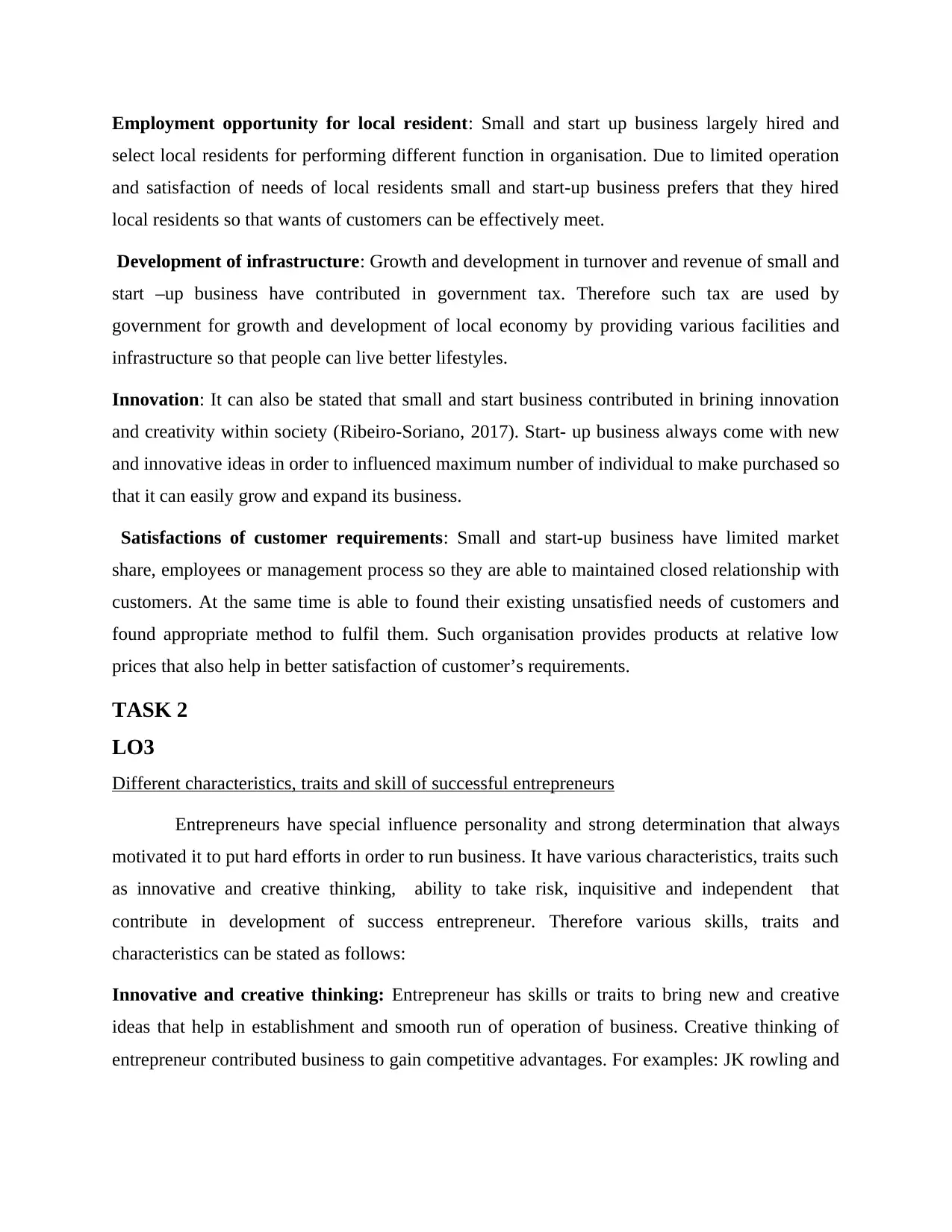
Employment opportunity for local resident: Small and start up business largely hired and
select local residents for performing different function in organisation. Due to limited operation
and satisfaction of needs of local residents small and start-up business prefers that they hired
local residents so that wants of customers can be effectively meet.
Development of infrastructure: Growth and development in turnover and revenue of small and
start –up business have contributed in government tax. Therefore such tax are used by
government for growth and development of local economy by providing various facilities and
infrastructure so that people can live better lifestyles.
Innovation: It can also be stated that small and start business contributed in brining innovation
and creativity within society (Ribeiro-Soriano, 2017). Start- up business always come with new
and innovative ideas in order to influenced maximum number of individual to make purchased so
that it can easily grow and expand its business.
Satisfactions of customer requirements: Small and start-up business have limited market
share, employees or management process so they are able to maintained closed relationship with
customers. At the same time is able to found their existing unsatisfied needs of customers and
found appropriate method to fulfil them. Such organisation provides products at relative low
prices that also help in better satisfaction of customer’s requirements.
TASK 2
LO3
Different characteristics, traits and skill of successful entrepreneurs
Entrepreneurs have special influence personality and strong determination that always
motivated it to put hard efforts in order to run business. It have various characteristics, traits such
as innovative and creative thinking, ability to take risk, inquisitive and independent that
contribute in development of success entrepreneur. Therefore various skills, traits and
characteristics can be stated as follows:
Innovative and creative thinking: Entrepreneur has skills or traits to bring new and creative
ideas that help in establishment and smooth run of operation of business. Creative thinking of
entrepreneur contributed business to gain competitive advantages. For examples: JK rowling and
select local residents for performing different function in organisation. Due to limited operation
and satisfaction of needs of local residents small and start-up business prefers that they hired
local residents so that wants of customers can be effectively meet.
Development of infrastructure: Growth and development in turnover and revenue of small and
start –up business have contributed in government tax. Therefore such tax are used by
government for growth and development of local economy by providing various facilities and
infrastructure so that people can live better lifestyles.
Innovation: It can also be stated that small and start business contributed in brining innovation
and creativity within society (Ribeiro-Soriano, 2017). Start- up business always come with new
and innovative ideas in order to influenced maximum number of individual to make purchased so
that it can easily grow and expand its business.
Satisfactions of customer requirements: Small and start-up business have limited market
share, employees or management process so they are able to maintained closed relationship with
customers. At the same time is able to found their existing unsatisfied needs of customers and
found appropriate method to fulfil them. Such organisation provides products at relative low
prices that also help in better satisfaction of customer’s requirements.
TASK 2
LO3
Different characteristics, traits and skill of successful entrepreneurs
Entrepreneurs have special influence personality and strong determination that always
motivated it to put hard efforts in order to run business. It have various characteristics, traits such
as innovative and creative thinking, ability to take risk, inquisitive and independent that
contribute in development of success entrepreneur. Therefore various skills, traits and
characteristics can be stated as follows:
Innovative and creative thinking: Entrepreneur has skills or traits to bring new and creative
ideas that help in establishment and smooth run of operation of business. Creative thinking of
entrepreneur contributed business to gain competitive advantages. For examples: JK rowling and
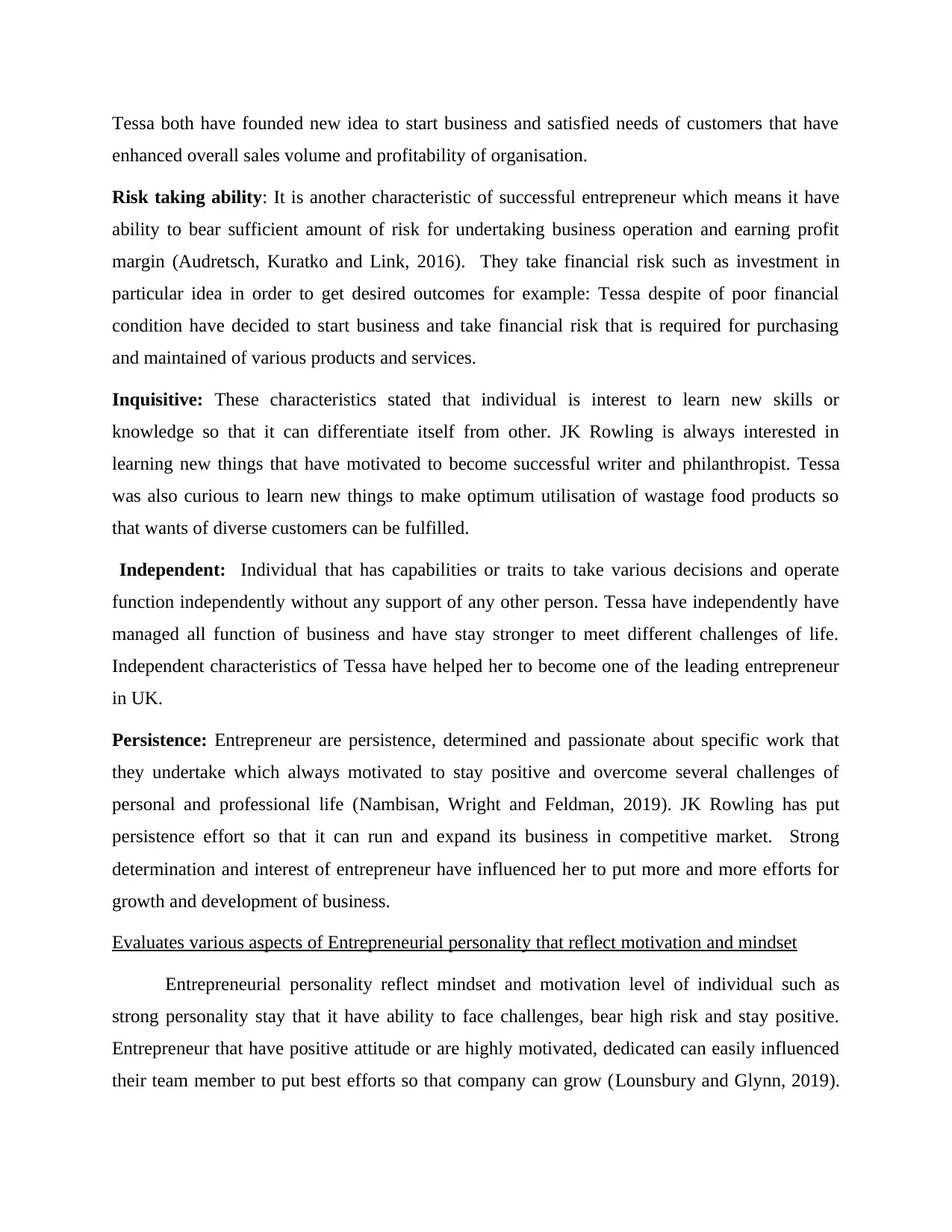
Tessa both have founded new idea to start business and satisfied needs of customers that have
enhanced overall sales volume and profitability of organisation.
Risk taking ability: It is another characteristic of successful entrepreneur which means it have
ability to bear sufficient amount of risk for undertaking business operation and earning profit
margin (Audretsch, Kuratko and Link, 2016). They take financial risk such as investment in
particular idea in order to get desired outcomes for example: Tessa despite of poor financial
condition have decided to start business and take financial risk that is required for purchasing
and maintained of various products and services.
Inquisitive: These characteristics stated that individual is interest to learn new skills or
knowledge so that it can differentiate itself from other. JK Rowling is always interested in
learning new things that have motivated to become successful writer and philanthropist. Tessa
was also curious to learn new things to make optimum utilisation of wastage food products so
that wants of diverse customers can be fulfilled.
Independent: Individual that has capabilities or traits to take various decisions and operate
function independently without any support of any other person. Tessa have independently have
managed all function of business and have stay stronger to meet different challenges of life.
Independent characteristics of Tessa have helped her to become one of the leading entrepreneur
in UK.
Persistence: Entrepreneur are persistence, determined and passionate about specific work that
they undertake which always motivated to stay positive and overcome several challenges of
personal and professional life (Nambisan, Wright and Feldman, 2019). JK Rowling has put
persistence effort so that it can run and expand its business in competitive market. Strong
determination and interest of entrepreneur have influenced her to put more and more efforts for
growth and development of business.
Evaluates various aspects of Entrepreneurial personality that reflect motivation and mindset
Entrepreneurial personality reflect mindset and motivation level of individual such as
strong personality stay that it have ability to face challenges, bear high risk and stay positive.
Entrepreneur that have positive attitude or are highly motivated, dedicated can easily influenced
their team member to put best efforts so that company can grow (Lounsbury and Glynn, 2019).
enhanced overall sales volume and profitability of organisation.
Risk taking ability: It is another characteristic of successful entrepreneur which means it have
ability to bear sufficient amount of risk for undertaking business operation and earning profit
margin (Audretsch, Kuratko and Link, 2016). They take financial risk such as investment in
particular idea in order to get desired outcomes for example: Tessa despite of poor financial
condition have decided to start business and take financial risk that is required for purchasing
and maintained of various products and services.
Inquisitive: These characteristics stated that individual is interest to learn new skills or
knowledge so that it can differentiate itself from other. JK Rowling is always interested in
learning new things that have motivated to become successful writer and philanthropist. Tessa
was also curious to learn new things to make optimum utilisation of wastage food products so
that wants of diverse customers can be fulfilled.
Independent: Individual that has capabilities or traits to take various decisions and operate
function independently without any support of any other person. Tessa have independently have
managed all function of business and have stay stronger to meet different challenges of life.
Independent characteristics of Tessa have helped her to become one of the leading entrepreneur
in UK.
Persistence: Entrepreneur are persistence, determined and passionate about specific work that
they undertake which always motivated to stay positive and overcome several challenges of
personal and professional life (Nambisan, Wright and Feldman, 2019). JK Rowling has put
persistence effort so that it can run and expand its business in competitive market. Strong
determination and interest of entrepreneur have influenced her to put more and more efforts for
growth and development of business.
Evaluates various aspects of Entrepreneurial personality that reflect motivation and mindset
Entrepreneurial personality reflect mindset and motivation level of individual such as
strong personality stay that it have ability to face challenges, bear high risk and stay positive.
Entrepreneur that have positive attitude or are highly motivated, dedicated can easily influenced
their team member to put best efforts so that company can grow (Lounsbury and Glynn, 2019).
⊘ This is a preview!⊘
Do you want full access?
Subscribe today to unlock all pages.

Trusted by 1+ million students worldwide
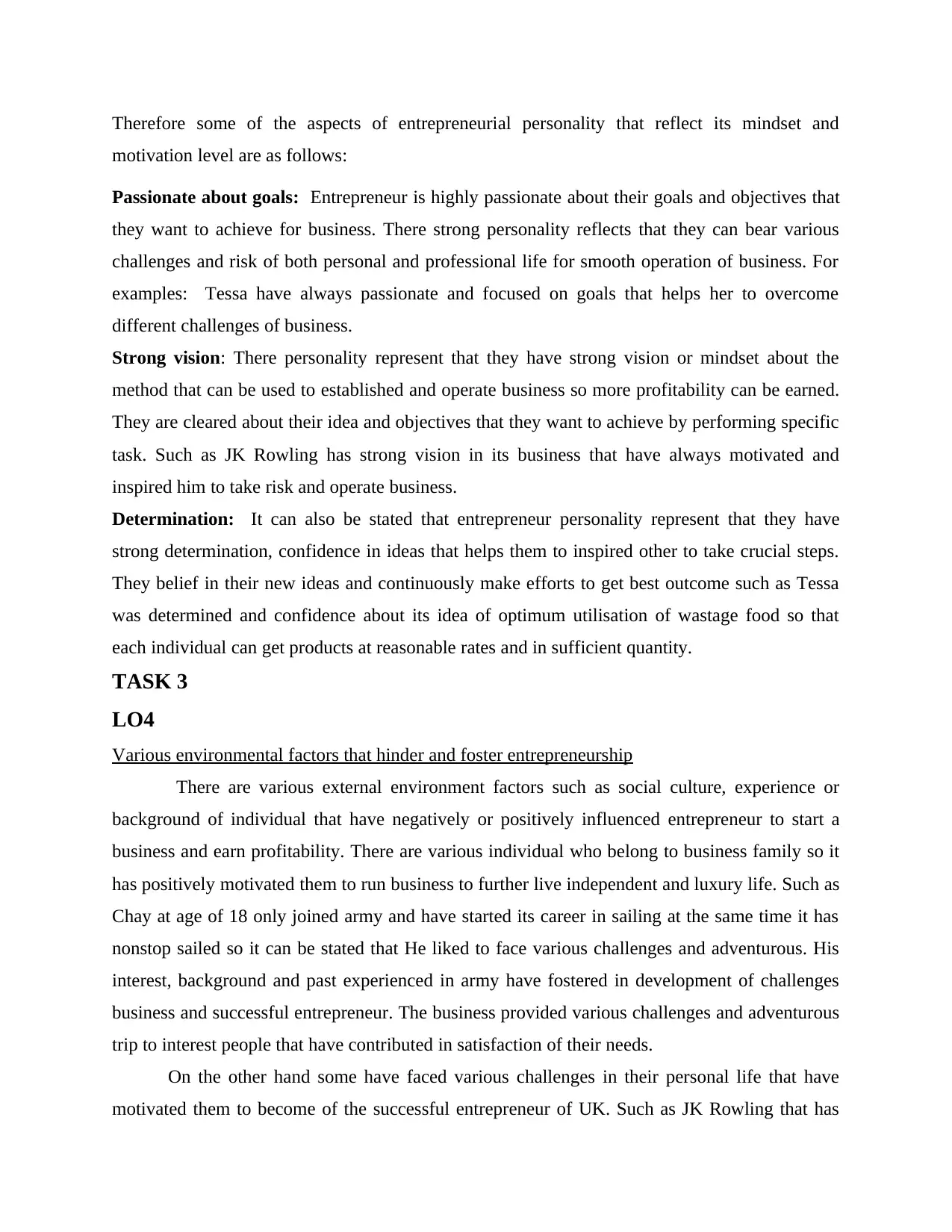
Therefore some of the aspects of entrepreneurial personality that reflect its mindset and
motivation level are as follows:
Passionate about goals: Entrepreneur is highly passionate about their goals and objectives that
they want to achieve for business. There strong personality reflects that they can bear various
challenges and risk of both personal and professional life for smooth operation of business. For
examples: Tessa have always passionate and focused on goals that helps her to overcome
different challenges of business.
Strong vision: There personality represent that they have strong vision or mindset about the
method that can be used to established and operate business so more profitability can be earned.
They are cleared about their idea and objectives that they want to achieve by performing specific
task. Such as JK Rowling has strong vision in its business that have always motivated and
inspired him to take risk and operate business.
Determination: It can also be stated that entrepreneur personality represent that they have
strong determination, confidence in ideas that helps them to inspired other to take crucial steps.
They belief in their new ideas and continuously make efforts to get best outcome such as Tessa
was determined and confidence about its idea of optimum utilisation of wastage food so that
each individual can get products at reasonable rates and in sufficient quantity.
TASK 3
LO4
Various environmental factors that hinder and foster entrepreneurship
There are various external environment factors such as social culture, experience or
background of individual that have negatively or positively influenced entrepreneur to start a
business and earn profitability. There are various individual who belong to business family so it
has positively motivated them to run business to further live independent and luxury life. Such as
Chay at age of 18 only joined army and have started its career in sailing at the same time it has
nonstop sailed so it can be stated that He liked to face various challenges and adventurous. His
interest, background and past experienced in army have fostered in development of challenges
business and successful entrepreneur. The business provided various challenges and adventurous
trip to interest people that have contributed in satisfaction of their needs.
On the other hand some have faced various challenges in their personal life that have
motivated them to become of the successful entrepreneur of UK. Such as JK Rowling that has
motivation level are as follows:
Passionate about goals: Entrepreneur is highly passionate about their goals and objectives that
they want to achieve for business. There strong personality reflects that they can bear various
challenges and risk of both personal and professional life for smooth operation of business. For
examples: Tessa have always passionate and focused on goals that helps her to overcome
different challenges of business.
Strong vision: There personality represent that they have strong vision or mindset about the
method that can be used to established and operate business so more profitability can be earned.
They are cleared about their idea and objectives that they want to achieve by performing specific
task. Such as JK Rowling has strong vision in its business that have always motivated and
inspired him to take risk and operate business.
Determination: It can also be stated that entrepreneur personality represent that they have
strong determination, confidence in ideas that helps them to inspired other to take crucial steps.
They belief in their new ideas and continuously make efforts to get best outcome such as Tessa
was determined and confidence about its idea of optimum utilisation of wastage food so that
each individual can get products at reasonable rates and in sufficient quantity.
TASK 3
LO4
Various environmental factors that hinder and foster entrepreneurship
There are various external environment factors such as social culture, experience or
background of individual that have negatively or positively influenced entrepreneur to start a
business and earn profitability. There are various individual who belong to business family so it
has positively motivated them to run business to further live independent and luxury life. Such as
Chay at age of 18 only joined army and have started its career in sailing at the same time it has
nonstop sailed so it can be stated that He liked to face various challenges and adventurous. His
interest, background and past experienced in army have fostered in development of challenges
business and successful entrepreneur. The business provided various challenges and adventurous
trip to interest people that have contributed in satisfaction of their needs.
On the other hand some have faced various challenges in their personal life that have
motivated them to become of the successful entrepreneur of UK. Such as JK Rowling that has
Paraphrase This Document
Need a fresh take? Get an instant paraphrase of this document with our AI Paraphraser
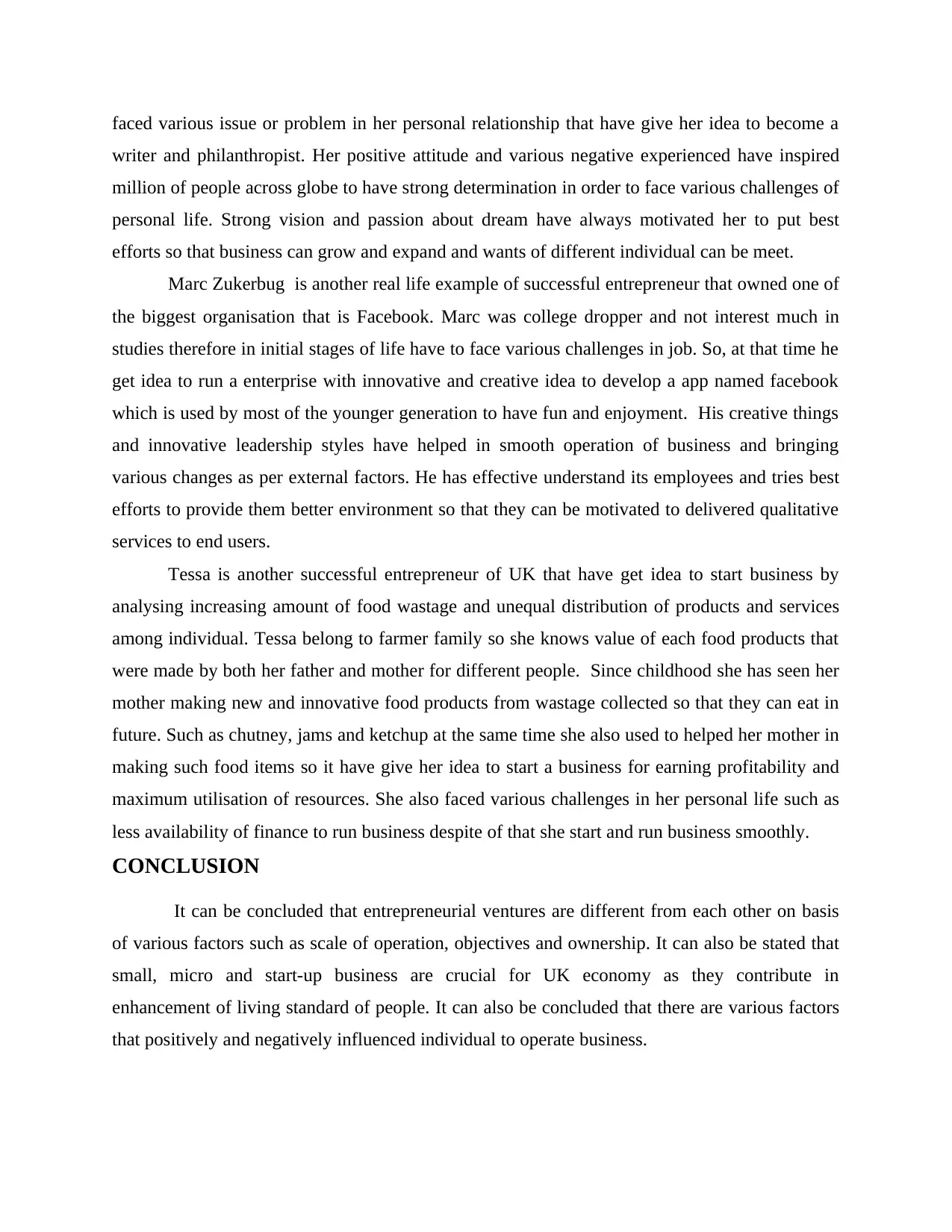
faced various issue or problem in her personal relationship that have give her idea to become a
writer and philanthropist. Her positive attitude and various negative experienced have inspired
million of people across globe to have strong determination in order to face various challenges of
personal life. Strong vision and passion about dream have always motivated her to put best
efforts so that business can grow and expand and wants of different individual can be meet.
Marc Zukerbug is another real life example of successful entrepreneur that owned one of
the biggest organisation that is Facebook. Marc was college dropper and not interest much in
studies therefore in initial stages of life have to face various challenges in job. So, at that time he
get idea to run a enterprise with innovative and creative idea to develop a app named facebook
which is used by most of the younger generation to have fun and enjoyment. His creative things
and innovative leadership styles have helped in smooth operation of business and bringing
various changes as per external factors. He has effective understand its employees and tries best
efforts to provide them better environment so that they can be motivated to delivered qualitative
services to end users.
Tessa is another successful entrepreneur of UK that have get idea to start business by
analysing increasing amount of food wastage and unequal distribution of products and services
among individual. Tessa belong to farmer family so she knows value of each food products that
were made by both her father and mother for different people. Since childhood she has seen her
mother making new and innovative food products from wastage collected so that they can eat in
future. Such as chutney, jams and ketchup at the same time she also used to helped her mother in
making such food items so it have give her idea to start a business for earning profitability and
maximum utilisation of resources. She also faced various challenges in her personal life such as
less availability of finance to run business despite of that she start and run business smoothly.
CONCLUSION
It can be concluded that entrepreneurial ventures are different from each other on basis
of various factors such as scale of operation, objectives and ownership. It can also be stated that
small, micro and start-up business are crucial for UK economy as they contribute in
enhancement of living standard of people. It can also be concluded that there are various factors
that positively and negatively influenced individual to operate business.
writer and philanthropist. Her positive attitude and various negative experienced have inspired
million of people across globe to have strong determination in order to face various challenges of
personal life. Strong vision and passion about dream have always motivated her to put best
efforts so that business can grow and expand and wants of different individual can be meet.
Marc Zukerbug is another real life example of successful entrepreneur that owned one of
the biggest organisation that is Facebook. Marc was college dropper and not interest much in
studies therefore in initial stages of life have to face various challenges in job. So, at that time he
get idea to run a enterprise with innovative and creative idea to develop a app named facebook
which is used by most of the younger generation to have fun and enjoyment. His creative things
and innovative leadership styles have helped in smooth operation of business and bringing
various changes as per external factors. He has effective understand its employees and tries best
efforts to provide them better environment so that they can be motivated to delivered qualitative
services to end users.
Tessa is another successful entrepreneur of UK that have get idea to start business by
analysing increasing amount of food wastage and unequal distribution of products and services
among individual. Tessa belong to farmer family so she knows value of each food products that
were made by both her father and mother for different people. Since childhood she has seen her
mother making new and innovative food products from wastage collected so that they can eat in
future. Such as chutney, jams and ketchup at the same time she also used to helped her mother in
making such food items so it have give her idea to start a business for earning profitability and
maximum utilisation of resources. She also faced various challenges in her personal life such as
less availability of finance to run business despite of that she start and run business smoothly.
CONCLUSION
It can be concluded that entrepreneurial ventures are different from each other on basis
of various factors such as scale of operation, objectives and ownership. It can also be stated that
small, micro and start-up business are crucial for UK economy as they contribute in
enhancement of living standard of people. It can also be concluded that there are various factors
that positively and negatively influenced individual to operate business.

⊘ This is a preview!⊘
Do you want full access?
Subscribe today to unlock all pages.

Trusted by 1+ million students worldwide
1 out of 14
Related Documents
Your All-in-One AI-Powered Toolkit for Academic Success.
+13062052269
info@desklib.com
Available 24*7 on WhatsApp / Email
![[object Object]](/_next/static/media/star-bottom.7253800d.svg)
Unlock your academic potential
Copyright © 2020–2026 A2Z Services. All Rights Reserved. Developed and managed by ZUCOL.




